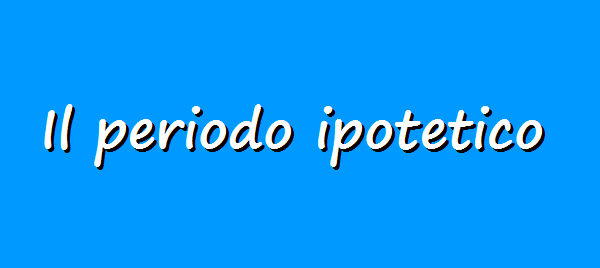Conditional sentences exist in many languages. In Italian we prefer to speak of the “periodo ipotetico” (hypothetical phrase) but what is meant is more or less the same as the English-language conditional sentence.

Conditional sentences are used to express the consequences of a hypothetical situation. The hypothetical condition (often expressed by the conjunction “se) is followed by a consequence.
![]()
If it rains… = the condition
…I don’t go out = the consequence
When forming a conditional sentence in Italian, the order of the condition and the consequence is not really important. You can put either one first. It depends on which element you want to emphasize:

An hypothesis can be certain, possible, or counterfactual.
1) The conditional sentence in the case of a certain hypothesis
In the case of a certain hypothesis, use the indicative form at its correct tense, both in the clause expressing the condition and in the clause expressing the consequence:
2) The conditional sentence in the case of a possible hypothesis
In the case of a possible hypothesis, use the imperfect subjunctive in the clause expressing the condition, and the simple conditional in the clause expressing the consequence:
![]()
(If I kept on not studying, I would have to repeat a year)
3) The conditional sentence in the case of a counterfactual hypothesis
In the case of a counterfactual hypothesis, use the past perfect subjunctive in the clause expressing the condition, and the perfect conditional in the clause expressing the consequence:
![]()
(If I had kept on not studying, I would have had to repeat a year)
Counterfactual hypothesis indicate situations that have not happened in the past, and that are therefore impossible to realize. Sometimes though you may want to talk about past hypotheses that still have consequences on the present. In this case, use the simple conditional, and not the perfect conditional:

(If I had kept on not studying, now I would have to repeat a year)
More on conditional sentences
As we have seen so far, the clause expressing the condition is almost always introduced by the word “se”. There are however other possibilities.
- You can start the clause directly with the verb, avoiding the “se”

- You can use the verb in the gerund form

- You can use the past participle of a verb:

Writing conditional clauses in Italian is not difficult..but it often constitutes the first big hurdle to pass for those studying italian! We advise you to revise the formation of the conditional and the subjunctive and practice these two forms a lot. When you have done so, building a conditional sentence will become easy.
Here are the links:
To better understand conditional sentences, see also:
- Exercises
- a song
- another song
- a text: “S’i fossi foco”
- Video